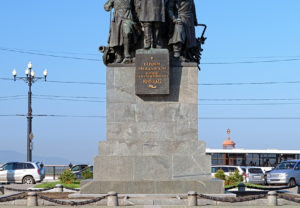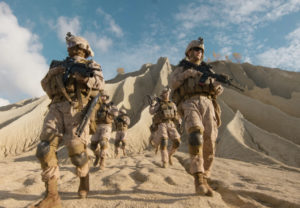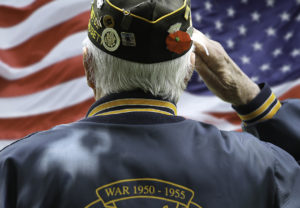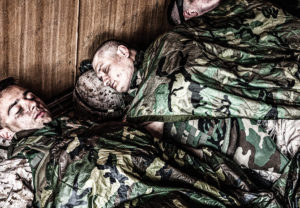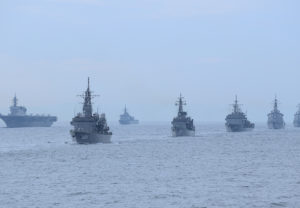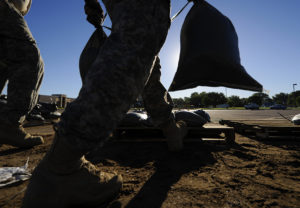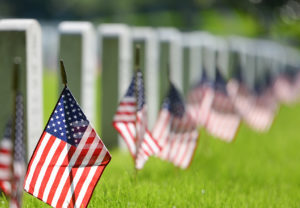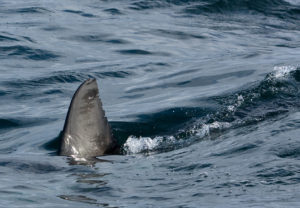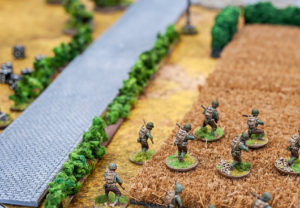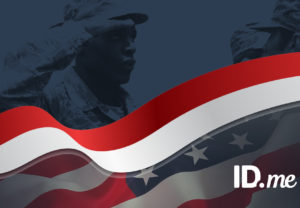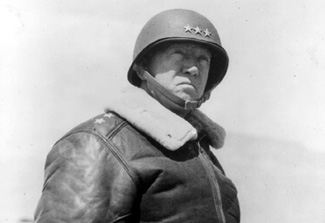10. General Anthony McAuliffe at the Battle of the Bulge
Completely surrounded by German forces, General McAuliffe, Acting Commander of the storied 101st Airborne Division, received an ultimatum demanding surrender from the German commander. His response?
To the German Commander:
NUTS!
The American Commander.
The German major who received the letter appeared confused, so he asked one of General McAuliffe’s officers what the message meant. Colonel Joseph Harper, commander of the 327th glider infantry, replied: “In plain English? Go to hell.”
The men of the 101st Airborne successfully defended their position for four days until reinforcements arrived. For his gallantry, General McAuliffe was awarded the Distinguished Service Cross and the Distinguished Service Medal. His one word reply also earned him a new moniker: General McAuliffe was known as “Nuts” for the rest of his career.
9. John Paul Jones and the Bonhomme Richard versus HMS Serapis
On 23 September, 1779, the 42 gun Bonhomme Richard commanded by Commodore John Paul Jones engaged the British warship, HMS Serapis, commanded by Captain Richard Pearson. Initially, things didn’t go too well for the Americans. With his ship sinking and his colors shot away, Jones heard Captain Pearson inquire, “Has your ship struck?”
Jones’ response:
I have not yet begun to fight!
Jones proceeded to ram his ship into the British ship. American sharpshooters helped clear the deck of British sailors, and, one of Jones’ men, hanging along a yard arm over the deck of HMS Serapis, dropped a grenade through a hatch on the Serapis that triggered a massive explosion. A few hours later, the British captain surrendered his ship to Jones.
The Bonhomme Richard was so badly damaged from the engagement that it sunk. No problem. Jones sailed away on his new boat, the Serapis.
8. Leonidas and the Spartans at the Battle of Thermopylae
During the summer of 480 BC, King Leonidas of Sparta led 7,000 Greek warriors to the pass of Thermopylae, where they faced an invading Persian Army estimated between 100,000 and 150,000 soldiers. Persian Emperor Xerxes demanded the Greeks surrender their arms.
King Leonidas of Sparta replied:
Come and take them.
King Leonidas and his vastly outnumbered force held off the invading Persians for a full seven days. On the second day of battle, the Greeks were betrayed by a local resident who showed the Persians a hidden path that allowed them to attack the Greeks from the rear. Upon hearing news of Persian forces in his rear, Leonidas dismissed the bulk of his army and formed a rear guard with 300 Spartans to protect their retreat so the Persian calvary would not cut down the retreating fighters on the open plains. The 300, as Leonidas’ Spartans are famously known today, fought heroically in an action that ultimately saved Greece from Persian rule — even though all of the Spartans died in the battle.
7. Genghis Khan and the Eternal Blue Sky
Born around 1162, the Mongolian warrior created the Mongol Empire by first crushing internal divisions that had previously divided the Mongol tribes. After tribal leaders named him “Genghis Khan” or Universal Ruler, the Mongol priests declared him the living representative of Mongke Koko Tengri, the Eternal Blue Sky, which implied that Genghis was divine and that it was his destiny to rule the world.
Genghis Khan Empire at his death:
Apparently, Genghis Khan accepted this role fully. He is reported to have told one of his captured enemies:
I am the Flail of God. If you had not committed great sins, God would have not sent a punishment like me upon you.
Wow. The Eternal Blue Sky is very angry. We’re glad that guy is gone.
6. Oliver Hazard Perry at the Battle of Lake Erie
You should expect a tough military quote from a man whose middle name literally means danger. During the War of 1812, Commodore William Hazard Perry led an American squadron against a British squadron on Lake Erie off the coast of Ohio. During the battle, 80% of the crew on Perry’s flagship, the Lawrence, were killed or wounded and every gun was rendered unusable. Despite the heavy losses, Perry transferred his command to another warship, the Niagara, and defeated the British.
The American victory marked the first time that a British fleet had ever been forced to surrender en masse. After the battle, Perry wrote these famous words to General William Henry Harrison, Commander of the Army of the Northwest:
We have met the enemy and they are ours.
5. General Lewis Burwell “Chesty” Puller at the Battle of Frozen Chosin
One of the most decorated Marines in American history, Chesty Puller earned the Distinguished Service Cross, five Navy Crosses, the Silver Star, the Legion of Merit with Combat “V” and one Oak Leaf Cluster, and the Bronze Star Medal with Combat “V.” During the Battle of Chosin Reservoir, 30,000 United Nations troops were surrounded by 67,000 Chinese soldiers who had used their local knowledge of the terrain to steal a march on Puller’s Marines and the larger American force. The battle began at Yudam-ni, when three Chinese divisions attacked three Marine Regiments, the 5th, 7th, and 11th, without advanced warning from American intelligence. Fox Company, from the 7th Marines, found itself isolated and fighting alone against an entire Chinese Division, the PVA 59th.
Cut off from American forces, and with temperatures dipping so far below freezing that the lubrication in the guns froze into a gel that rendered weapons useless, Chesty, then the Commanding Officer of the First Marine Division, produced three quotes that etched a permanent place in the annals of American warfare. After the initial attack, he remarked:
We’ve been looking for the enemy for some time now. We’ve finally found him. We’re surrounded. That simplifies things.
During the height of the fighting, he exhorted his men:
Remember, you are the First Marines! Not all the Communists in Hell can overrun you.
After inflicting heavy casualties on the attacking Chinese forces, the Marines managed to breakthrough the surrounding Chinese divisions in good order. Puller, still as fiery as ever, stated:
There are not enough chinamen in the world to stop a fully armed Marine regiment from going wherever they want to go.
We could have based this entire article on Chesty Puller quotes.
4. Audie Murphy and the Colmar Pocket
Initially rejected as unfit for service by the Marine Corps due to his slight stature, Audie Murphy joined the Army and went on to become the most decorated service member of World War II. He earned the Medal of Honor during a firefight in France on January 26, 1945 while serving as a company commander. Only 19 years old, then 2nd Lieutenant Murphy ordered his men to fall back to positions in the woods after the Germans attacked in force with armor reinforced by dismounted infantry.
Despite this order, Murphy remained in his forward command post while a German company advanced against his position in order to direct artillery fire through his field telephone that killed or wounded a significant number of German soldiers. When six tanks from the attacking German force drew abreast of his position, Lieutenant Murphy ran to a burning tank destroyer that had been abandoned by its crew after it had been hit. Loaded with ammunition, the tank destroyer could have blown up at any moment, yet Murphy manned the .50 caliber machine gun on top of the tank destroyer for a full hour.
Over the course of that hour, the German company directed all of their fire at his position yet somehow only managed to wound Murphy in his leg. Murphy’s machine gun fire is estimated to have killed or wounded 50 German soldiers, including a squad that got as close as ten yards away while trying to sneak up on him. When the German infantry began to withdraw, the tanks followed because they lost their dismounted support.
Once he exhausted all of his ammunition, Murphy dismounted from the tank destroyer, which blew up behind him as he walked away (you can’t make this stuff up), and rejoined his men. Refusing medical attention, he organized his men in a counterattack and drove the attacking German forces from the woods.
After the war, someone asked him why he stood alone against an entire German company. Murphy replied:
They were killing my friends.
During his time in service, Murphy received every possible US Army military combat award for valor .
3. Joan of Arc and the Duke of Bedford
Joan of Arc, a French farm girl from a poor family, traveled to the court of Charles VII, then uncrowned, who was attempting to re-claim the French throne from the British. During a private audience with the heir apparent to the French throne, Joan convinced Charles to place her in charge of his army, largely on the strength of her claim that the Archangel Michael, along with Saints Margaret and Catherine, had appeared to her in her father’s garden when she was 13 and instructed her to support Charles VII and remove the English from France. Incredibly, Charles bought her story, and granted her request.
He dispatched Joan of Arc at the head of his army to the city of Orleans, where English forces besieged the city. Before she departed, Joan wrote a letter to the Duke of Bedford, the de facto King of England as Henry VI was an infant, to warn him that she was coming. She wrote:
The Maid and her soldiers will have the victory. Therefore the Maid is willing that you, Duke of Bedford, should not destroy yourself.
Whether the Duke took Joan’s threats — and her references to herself in the third person — seriously is not known. But nine days after arriving at Orleans, Joan’s army crushed the English forces. Shortly afterwards, her army destroyed another English army sent against her. Just as the angels had told her when she was 13, Joan led a French army to Reims in 1429 were the coronation of Charles VII as King of France took place in Reims Cathedral.
2. Admiral David Glasgow Farragut at the Battle of Mobile Bay
Admiral Farragut was leading a Federal fleet against a Confederate fleet and three forts guarding the Port of Mobile when one of his ironclad ships, the Tecumseh, struck an underwater mine and sank within three minutes. 93 men aboard her were lost. Captain James Alden of the Brooklyn, the ship behind the Tecumseh, stopped and signaled Farragut they had stopped because torpedoes were in their path, an action that halted Farragut’s fleet and left the ships exposed to fire from the Confederate forts.
Seeing this message, Farragut took his flagship, the Hartford, around the Brooklyn to lead the way into the minefield where the Tecumseh had just been lost. To do so, he gave the now famous order:
Damn the torpedoes, full speed ahead!
The Federal fleet navigated the minefield without further losses and defeated the Confederate fleet waiting for them on the other side. Without naval support, the three Confederate forts guarding the entrance to Mobile Bay surrendered within days of the battle. In an interesting footnote to the battle, Admiral Farragut was lashed to the rigging of the Hartford after he climbed so high in the ship’s rigging during the battle that Captain Percival Drayton of the Hartford dispatched a sailor to tie him down so that a fall would not kill him.
1. Sergeant Alvin C. York at Chatel-Chenery, France
After his battalion had suffered heavy casualties from German machine gun fire, then Corporal York was assigned to infiltrate the enemy lines with sixteen other soldiers. The group had captured a small German force when machine gun fired killed or wounded nine members of York’s group. York left the remaining seven men to guard the prisoners while he charged the German machine guns — all 30 of them — by himself.
He recalled:
And those machine guns were spitting fire and cutting down the undergrowth all around me something awful. And the Germans were yelling orders. You never heard such a racket in all of your life. I didn’t have time to dodge behind a tree or dive into the brush… As soon as the machine guns opened fire on me, I began to exchange shots with them. There were over thirty of them in continuous action, and all I could do was touch the Germans off just as fast as I could. I was sharp shooting… All the time I kept yelling at them to come down. I didn’t want to kill any more than I had to. But it was they or I. And I was giving them the best I had.
“I didn’t want to kill any more than I had to.” Amazing. York actually felt sorry that over 100 Germans, with 30 machines guns, didn’t realize they had no chance to live if they continued to fight against him. This quote is the toughest of them all because York wasn’t actually trying to sound tough; he was just stating fact: if all 100 of you fight against me, then you’re all going to go down and I feel sorry for you. We think Sergeant York must be Chuck Norris’ father.
During York’s assault, six German soldiers charged him with fixed bayonets. York, who had run out of ammunition for his Enfield rifle, killed all six of them with his Colt .45. After that action, German First Lieutenant Paul Vollmer, who had exhausted all of his ammunition attempting to stop York, examined his increasing losses and concluded he should surrender his unit. York led 132 German prisoners back to American lines where he was promptly promoted to Sergeant and eventually awarded the Medal of Honor for his actions.








